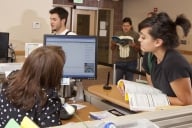You have /5 articles left.
Sign up for a free account or log in.

Adjunct- and instructor-level faculty are more likely to feel comfortable incorporating career development into courses.
monkeybusinessimages/iStock/Getty Images +
Faculty members serve as a critical resource for students charting their career paths, according to an April survey from the National Association for Colleges and Employers (NACE), with support from the American Association of Colleges and Universities and the National Society of Experiential Education.
The study found 92 percent of faculty have been asked for career advice from a student in their disciplinary area within the past year, and three in five faculty have been solicited by alumni from their institution for career help.
The findings point to the role faculty members play in fulfilling student success goals as students launch into their lives after graduation, particularly because not every student engages with their career center. A fall 2023 Student Voice survey from Inside Higher Ed and College Pulse found one-third of all students had never interacted with their career center, a stat that remains similar (28 percent) among graduating seniors.
Methodology
The survey was fielded during fall 2023 and included responses from 6,880 faculty members, ranking from full professor to adjunct professor from two- and four-year institutions across the country.
State of play: Among NACE’s findings:
- Four in 10 faculty members said they regularly advised 44 percent of their students in their disciplinary area on career exploration in the past year. (In the fall 2023 Student Voice survey, seven in 10 students said at least one professor had helped them explore potential careers or develop specific career skills.)
- Faculty members at four-year institutions were more likely to have provided career advising (42 percent) to students than their two-year counterparts (38 percent).
- Over half of faculty members say they’re “very comfortable” advising students inside their own discipline or major, but 22 percent say they’re not comfortable providing students with career advice.
- The most common advice students are seeking relates to career opportunities within their major (64 percent), graduate school decisions (56 percent) or internship opportunities (55 percent). Just over half of alumni have wanted a professor’s help with applying for graduate school (56 percent) or making professional connections (51 percent), faculty reported.
When it comes to preparing students for their lives after graduation, faculty overall indicated high levels of awareness related to their subject area, but still rely on their career center for support.
- Most faculty members rate their knowledge of careers within their disciplinary area (64 percent) as high or very high, and nearly half (47 percent) rate their knowledge of labor market information and trends as very high.
- Eighty percent of faculty say they integrate career readiness and career information into their classes, the largest share aligning course assignments or course outcomes with career competencies. Adjunct faculty (83 percent) and lecturers (84 percent) were most likely to say they integrate career information into their courses.
- One-third (34 percent) of faculty say they don’t include career information in their course because they don’t feel they have the background or expertise to do so.
- Just under four in 10 faculty want more information about the labor market and professional development in careers and career preparation to better advise students.
- When asked how they partner with the career center, seven in 10 faculty said they refer students to the career center and two in five bring in career center staff to talk about career resources.
DIY: Based on the survey results, the report offers recommendations for administrators and faculty members to help bridge student learning into careers.
- Integrate competencies into curriculum. Administrators can encourage faculty members in this work by incentivizing career integration and building an institutional awareness around career competencies.
- Invest in professional development. To provide improved career advising to students, faculty members can undergo professional development and educational opportunities to learn more about their industries or how to embed careers into course content. Some examples of offerings include workshops reorienting class syllabi to focus on competencies or creating a faculty toolkit for career advising.
- Collect data. Understanding student outcomes and the connections between career center usage or experiential learning can create an institutional focus on high-impact practices for career success.
- Build internal partnerships. Campus career center professionals are a wellspring of knowledge, so inviting and encouraging partnerships between faculty members and staff can aid students’ career development.
- Develop experiential learning opportunities. Many academic departments provide hands-on learning, whether through community partnerships, projects, undergraduate research or internships, so making these experiences visible or increasing offerings can also support students’ growth and overall success.
Do you have a career prep tip that might help others encourage student success? Tell us about it.




